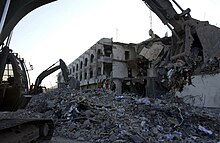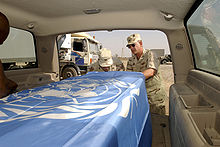Bomb attack on the Canal Hotel
The Canal Hotel bombing was a car bomb attack in Baghdad, Iraq on August 19, 2003 , killing 22 people, including the United Nations High Commissioner for Human Rights , Sérgio Vieira de Mello . The Canal Hotel was destroyed in the attack. The Islamic fundamentalist and terrorist Abū Musʿab az-Zarqāwī claimed responsibility for the attack .
procedure
The explosion was triggered in the afternoon of August 19, 2003 through a by a suicide bomber ignited car bomb . At the time of the explosion, Martin Barber, director of the United Nations Mine Action Program (UNMAS), held a press conference.
The murder vehicle was identified as a large Kamaz flatbed truck . These trucks, made in Eastern Europe, were part of the vehicle fleet of the former Iraqi establishment. Investigations indicated that the bomb was built from old ammunition stocks from the Iraqi pre-war arsenal.
The force of the explosion also damaged a neighboring hospital and a center for civil-military operations for the US Army . The shock wave was felt for over a mile and a half.
Directly below Sérgio Vieira de Mello's office was the Humanitarian Information Center of the United Nations Office for the Coordination of Humanitarian Affairs, which was hit directly by the explosion. Of the eight employees and one visitor, some were killed instantly. Sérgio Vieira de Mello and Gil Loescher initially survived seriously injured, but were trapped in the rubble. In a rescue operation lasting several hours, Loescher was saved after his broken legs were amputated, but Vieira de Mello died before he could be freed.
In the book The Prince of the Marshes , the British author Rory Stewart describes his experiences on the day of the attack:
“I had wandered past the security point without anyone attempting to search me or ask my business. The Iraqis coming in and out of the compound were good-humored. I had said to my friend that things seemed pretty relaxed. She had replied that the special representative was proud that Iraqis could approach the UN building - unlike in the Green Zone , whose barriers were a half mile from the main offices.
... I went to the canteen, where I sat from ten until two in the afternoon, talking to local NGO staff who came in to eat and use the Internet. I particularly liked a Tunisian security advisor who had served in the Balkans and was worried about terrorists targeting the UN.
I left at two, intending to return later in the afternoon to use the Internet. But when I came back at 4:30, a thick column of smoke was rising from either end of the building, families were screaming and pushing at a cordon of US soldiers, and the woman who had served me my salad in the cafeteria was running toward us. In my brief time away from the building, a suicide bomber had driven his truck up beneath De Mello's office window. "
background
Abū Musʿab az-Zarqāwī , leader of the terrorist organization Jama'at al-Tawhid wal-Jihad , confessed to the attack in April 2004.
According to Abū Musʿab az-Zarqāwī, de Mello was the explicit target of the attack. He gave the reason for this that de Mello helped East Timor to become independent from Indonesia. Zarqāwī said that de Mello was involved in the illegal removal of territory from the Islamic Caliphate and was therefore a thief and a criminal.
consequences
One month after the attack - on September 22, 2003 - there was another suicide attack with a car bomb near the United Nations headquarters in Baghdad. One security guard was killed and 19 people injured.
Within weeks of the attacks, most of the 600 United Nations employees were withdrawn from Iraq. The attacks had a lasting impact on United Nations security rules.
Victim
| Surname | Age | nationality | position |
|---|---|---|---|
| Sérgio Vieira de Mello | 55 |
|
United Nations Special Envoy, United Nations Assistance Mission in Iraq |
| Nadia Younes | 57 |
|
Head of Staff at Vieira de Mello |
| Fiona Watson | 35 |
|
On the staff of Vieira de Mello |
| Jean-Sélim Kanaan | 33 |
|
On the staff of Vieira de Mello |
| Richard Hooper | 40 |
|
Senior advisor to the UN Under-Secretary-General for the Department of Political Affairs |
| Manuel Martín-Oar | 56 |
|
Naval captain, assistant to the Spanish special ambassador in Iraq |
| Christopher Klein-Beekman | 32 |
|
Program coordinator, UN Children's Fund |
| Reham Al-Farra | 29 |
|
Department of Public Information |
| Martha Teas | 47 |
|
UNOHCI manager |
| Leen Assad Al-Qadi | 32 |
|
UNOHCI information assistant |
| Ranillo Buenaventura | 47 |
|
UNOHCI Secretariat for Vieira de Mello |
| Reza Hosseini | 43 |
|
UNOHCI Humanitarian affairs officer |
| Ihsan Taha Husein | 26th |
|
UNOHCI driver |
| Basim Mahmoud Utaiwi | 40 |
|
UNOHCI security guards |
| Raid Shaker Mustafa Al-Mahdawi | 32 |
|
United Nations Monitoring, Verification and Inspection Commission (UNMOVIC) |
| Gillian Clark | 47 |
|
Christian Children's Fund |
| Arthur Helton | 54 |
|
Director of peace and conflict studies, US Council on Foreign Relations |
| Alya Ahmad Souza | 54 |
|
World bank |
| Khidir Saleem Sahir |
|
Citizen | |
| Saad Hermis Abona | 45 |
|
Workers at a UN supplier (Canal Hotel Cafeteria) |
| Omar Kahtan Mohamed Al-Orfali | 34 |
|
Driver / Translator, Christian Children's Fund |
| Emaad Ahmed Salman al-Jobody | 45 |
|
electrician |
Marilyn Manuel, a Filipino employee at Vieira de Mello, was originally listed as missing and presumably dead. However, she had survived; she had been taken to an Iraqi hospital that had not reported her admission to the United Nations.
Research and guesswork
In an audio recording that was posted on a website on April 6, 2004 and classified by the CIA as "probably authentic", Abū Musʿab az-Zarqāwī confessed to several attacks, including the one on August 19, 2003.
In February 2006, the US TV show Frontline presented an audio recording of Zarqawi - possibly the one from April 2004 - in which Zarqawi gave motives for the attack:
“We destroyed the UN building, the protectors of Jews, the friends of the oppressors and aggressors. The UN has recognized the Americans as the masters of Iraq. Before that, they gave Palestine as a gift to the Jews so they can rape the land and humiliate our people. Do not forget Bosnia, Kashmir, Afghanistan and Chechnya. "
In December 2004 the Jamestown Foundation also held Abu Musab al-Zarqawi and his organization Jama'at al-Tawhid wal-Jihad responsible for the attack.
The Italian newspaper Corriere della Sera identified the suicide bomber as the Algerian Fahdal Nassim. Other speculations have included Baathists, Sunni or Shiite military, or organized criminal gangs.
Awraz Abd Aziz Mahmoud Sa'eed, known as al-Kurdi, admitted planning the terrorist attack on Abu Musab al-Zarqawi. Al-Kurdi was captured by US forces in 2005 and sentenced to death by an Iraqi court; the death sentence was carried out by hanging on July 3, 2007.
Aftermath
United Nations Secretary-General Kofi Annan announced that the attacks will not stop United Nations efforts to rebuild Iraq:
“Nothing can excuse this act of unprovoked and murderous violence against men and women who went to Iraq for one purpose only: to help the Iraqi people recover their independence and sovereignty, and to rebuild their country as fast as possible, under leaders of their own choosing. ”
The daughter of Gil Loescher, who survived seriously injured, filmmaker Margaret Loescher, produced a film in 2004 about her father's experiences with the title Pulled from the Rubble . | Ref =
On December 11, 2008, the United Nations passed a resolution on humanitarian aid. Herein is recognized personnel involved in humanitarian aid under the aegis of the United Nations, and was by this resolution in memory of the 22 victims of the terrorist attack of 19 August 2003 World Humanitarian Day (English World Humanitarian Day ) - recurring at 19 August - proclaimed.
literature
- United Nations (Ed.): Report of The Independent Panel on the Safety and Security of UN Personnel in Iraq . October 20, 2003 (English, online [PDF; 712 kB ]).
Web links
- Senior WHO official, Dr David Nabarro, describes his experience in the UN bombing. In: who.int. 2003, accessed May 21, 2017 .
- Report of the Security in Iraq Accountability Panel (SIAP), New York. (PDF) March 3, 2004, accessed May 21, 2017 .
- UN Headquarters Compound. Retrieved May 21, 2017 .
Individual evidence
- ↑ Joel Roberts: Baghdad Bomb Crude But Deadly. CBS News, August 21, 2003, accessed May 21, 2017 .
- ^ OCHA bulletin tribute.
- ^ Rory Stewart: The Prince of the Marshes and Other Occupational Hazards of a Year in Iraq . Ed .: Harcourt. 2006, ISBN 978-0-15-603279-7 . Here pages 101-103.
- ↑ a b Pam Benson: CIA: Zarqawi tape 'probably authentic'. (No longer available online.) CNN, July 4, 2004, archived from the original on October 3, 2012 ; accessed on February 22, 2015 (English). Info: The archive link was inserted automatically and has not yet been checked. Please check the original and archive link according to the instructions and then remove this notice.
- ↑ Christopher Hitchens: Don't bother looking for explanations for terrorist attacks. In: Slate Magazine. October 3, 2005, accessed May 21, 2017 .
- ↑ Joel Roberts: Blast Near Baghdad UN Compound. In: CBS News. September 22, 2003, accessed May 21, 2017 .
- ↑ Kim Ghattas: Mixed feelings over UN Iraq role. BBC News , August 11, 2007, accessed February 22, 2015 .
- ^ Press Briefing by Manoel de Almeida e Silva, Spokesman for the Special Representative of the Secretary-General on Afghanistan. United Nations, August 21, 2003, accessed February 6, 2011 .
- ^ UN wrestling with security questions one year after Baghdad bombing - Annan. United Nations, August 19, 2004, accessed February 6, 2011 .
- ^ The Independent Panel on the Safety and Security of UN Personnel in Iraq
- ^ Diane Cardwell: First, Terrible News. Then a Call From Iraq Brings Joy. In: The New York Times. August 23, 2003, accessed May 21, 2017 .
- ↑ a b The Insurgency. Transcript from a TV broadcast by Frontline on February 21, 2006. Retrieved May 21, 2017 .
- ^ Gary Gambill: Abu Musab Al-Zarqawi: A Biographical Sketch. (No longer available online.) In: Terrorism Monitor, Volume 2, Issue 24. The Jamestown Foundation, December 16, 2004, archived from the original on September 30, 2007 ; accessed on February 20, 2015 .
- ^ Terrorism Monitor - The Jamestown Foundation. (No longer available online.) Archived from the original on September 30, 2007 ; accessed on December 11, 2014 . Info: The archive link was inserted automatically and has not yet been checked. Please check the original and archive link according to the instructions and then remove this notice.
- ^ Council on Foreign Relations The UN Attack
- ↑ Iraq hangs man who confessed to UN attack. (No longer available online.) In: National Post. Archived from the original on September 28, 2013 ; Retrieved February 22, 2015 (English, undated). Info: The archive link was inserted automatically and has not yet been checked. Please check the original and archive link according to the instructions and then remove this notice.
- ^ Pulled from the Rubble (2004). In: IMDb. November 20, 2004, accessed December 11, 2014 .
- ↑ Strengthening of the coordination of emergency humanitarian assistance of the United Nations. United Nations General Assembly, December 3, 2008, accessed May 21, 2017 .


